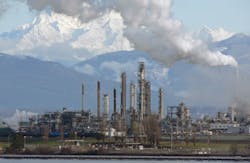Chemical Safety Board releases final report on deadly Tesoro refinery explosion
The U.S. Chemical Safety Board (CSB) has published its final report on the accident at the Tesoro refinery in Anacortes, Washington, in April 2010, in which seven people were killed.
The report confirms the findings released in the interim report, identifying the direct cause of the incident to be a condition known as High Temperature Hydrogen Attack (HTHA) that had weakened the steel equipment over a long period of time but had remained undetected prior to the explosion. However, the report also found that the refinery's safety culture was "lacking" and that resulted in a "complacent attitude" towards leaks and occasional fires that had been occurring for years.
The CSB has called for dramatic regulatory reforms, including a full review of the Chemical Accident Prevention Provisions by the U.S. Environmental Protection Agency (EPA), so that refineries are required to implement a new safer systems analysis. It also recommended the implementation of the so-called "hierarchy of controls" to the maximum possible extent when facilities are establishing safeguards for identified process hazards.
Under current regulations, even if refiners detect HTHA they are not required to install materials that are HTHA resistant. Since the EPA cannot adopt the changes immediately, the CSB recommends that in the meantime the EPA should use its authority under the Clean Air Act's General Duty Clause to prevent similar accidents in future, CSB chairman Rafael Moure-Eraso commented in a statement.
